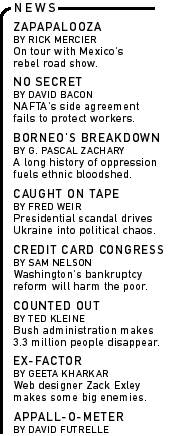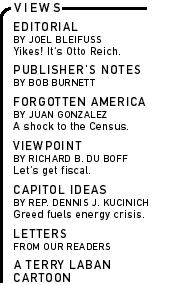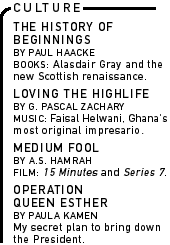

|

|

|

|
| |
|
|
|
Zack Exley has a knack for attracting attention. His parody Web sites have created such a stir that one target--George W. Bush--went so far as to proclaim: "There ought to be limits to freedom." But his latest target, CNN, is fighting back with more than just indignation. They are suing Exley for copyright infringement over his parody of their financial news site, CNNfn.com. Exley's site, CNNdn, is modeled after CNNfn, except that it is set in the year 2002 and depicts a world where the dot-com economy has come to a crashing halt. The site has mock news articles reporting that billionaire investor Warren Buffet poured in money to turn dying dot-coms eBay, Yahoo! and Google into nonprofit organizations. "It was just an idea I had on a Sunday afternoon," says Exley, a 31-year-old Boston computer consultant. The site was launched on December 12.A month later a letter from a CNN lawyer
Exley says that prior to the lawsuit, traffic on the site was minimal, but when he posted the letter from the lawyers, it started to pick up again. As the story gained media attention, traffic at the site soared--peaking at 100,000 hits a day. However, in late January, CNN's parent company, AOL Time Warner, won a temporary restraining order on the site, forcing Exley to pull it off the Web. Exley insists that his "Onion-style" parody of CNN is a valid form of satire. He has moved the Web site to a new location (whosealphabet.com), and posts continual updates on the situation--including a "comparative analysis" of what he and AOL Time Warner each have to gain and lose by the lawsuit. According to his analysis, one of his "gains" from the lawsuit is "something to talk about at parties for the next couple of months. ('Why yes, I am being sued by CNN.') Once they told me to take down the site or they'd sue," Exley laughs, "I knew it was going to be fun." Raised in Hartford, Connecticut, Exley took an interest in computers as early as junior high, but quit because he didn't want to "become a computer geek." After graduating from the University of Massachusetts, he began working as a union organizer for the United Autoworkers and the AFL-CIO. Exley left union organizing at age 29 and began working as a full-time computer programmer--an occupation he found less than satisfying. "IT workers work 45 minutes a day," Exley says. "I had a lot of time on my hands." The presidential election was still in its earliest stages, and he began following stories about George W. Bush, some of which painted him as an unintelligent businessman who'd had a cocaine problem. "I was blown away by the hypocrisy of it all," Exley says, "considering Bush's strict drug laws." Exley decided to check out the official Bush Web site, and discovered that the domain GWBush.com was unreserved. He snatched it up in December 1998. The site closely resembles the official Bush campaign Web site, but with a dark twist. An article supposedly penned by Bush defends his tax cut plan by comparing it to Mao's "Great Leap Forward" and Stalin's Soviet economic plan. The site also features doctored photos of Bush smoking a joint and snorting cocaine, many of which were submitted by fans. Ironically, Exley's parody Web site gained notoriety only after the candidate's legal team tried to have it pulled from the Internet, and Bush publicly remarked, "There's a lot of garbage in politics, and obviously this is a garbageman." Another Exley creation to garner a lot of attention was his Countercoup.org. Posted a month before the presidential election, it cited a date and time to protest, should Bush win the electoral college but not the popular vote. Within days after the election, people had bombarded the site, using it as a posting board to set up protests in 50 major cities, which drew nearly 10,000 people. Inspired by the events, Exley is now trying to create Internet tools to help organizers. "It showed me that we're not tapping the potential of the Web," he says. Anti-Bush bumper-sticker sales allow him to "eke out" a living while he awaits the outcome of the CNN case. Among other things, he is writing a book about union organizing, and trying to create a PAC that will sponsor humorous but hard-hitting anti-Bush ads in the next presidential election. Some see Exley's antics as a plea for attention, but he insists that his sites are just an example of how the left can utilize the Web to galvanize change. "If you have something interesting to put out there, then the Internet drops the physical barriers," he says. "Anyone can publish a Web site, so what's our excuse?" Even if his Web sites don't bring down corporate media or overturn
the next election, Exley says that his 15 minutes of fame have been
an interesting experience. "Hey," he says, "it broke up the monotony
of computer programming."
|


